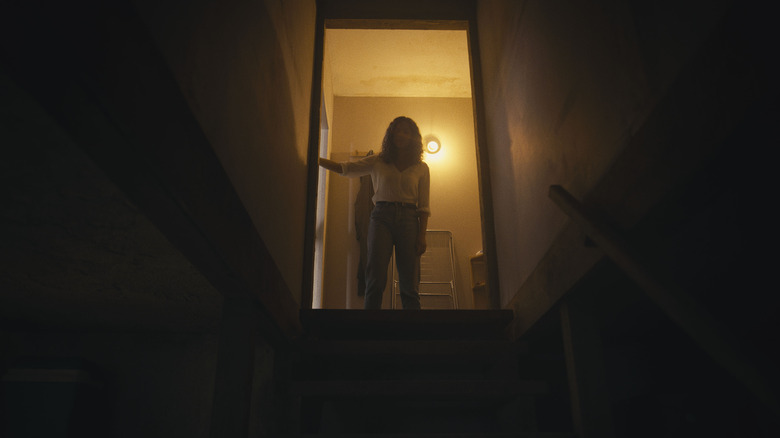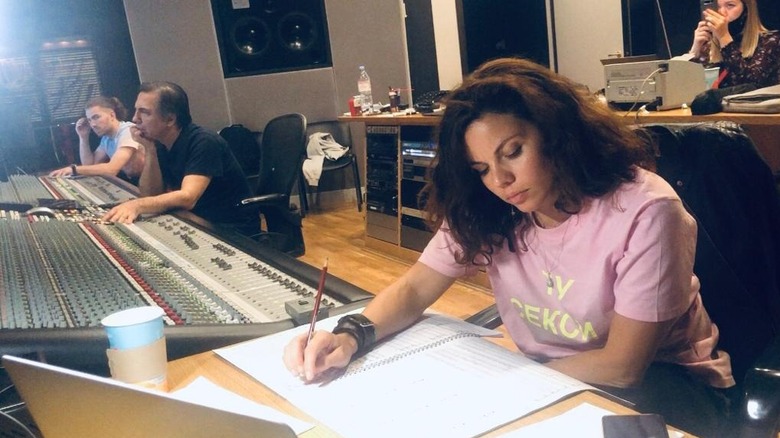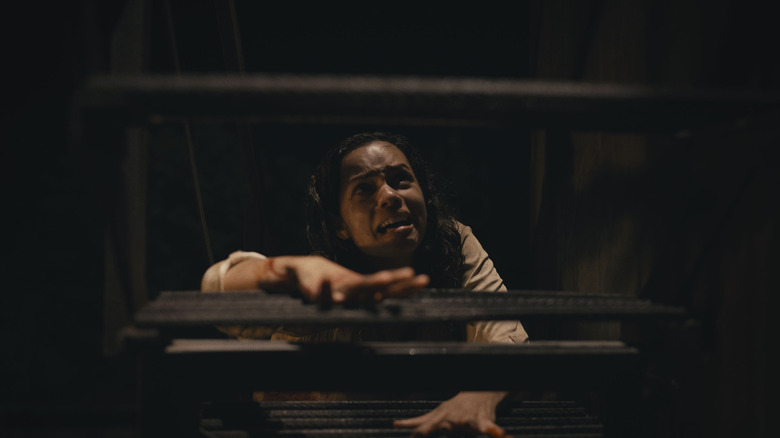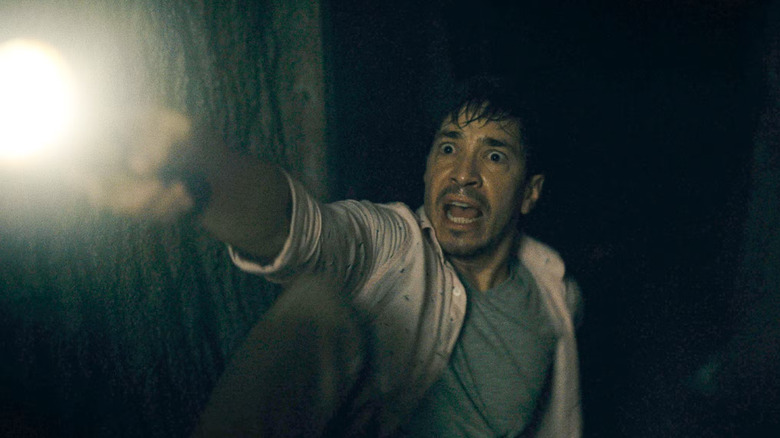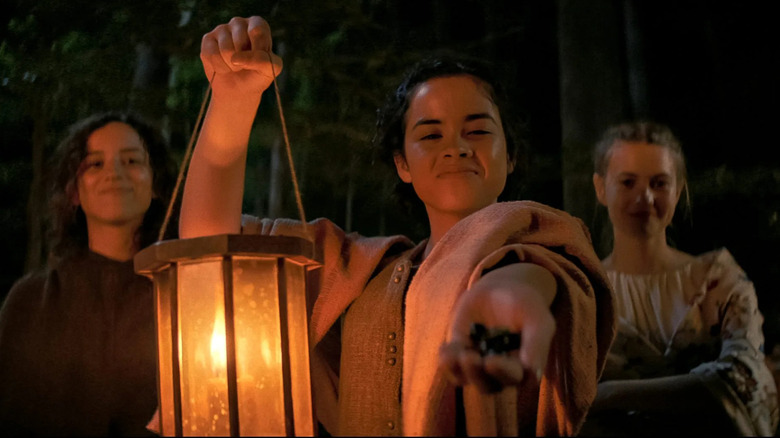Barbarian Composer Anna Drubich Talks About Scoring The Movie In Three Weeks [Exclusive Interview]
One of the finest horror scores of 2022 was from a composer who's not a fan of the genre. Anna Drubich doesn't watch horror movies, but over the last few years, she's scored the hell out of several of them, including "Barbarian." Without obvious homages or references, Drubich composed an often subtle, hair-raising score that went low where the genre tends to go loud.
Over the last few years, Drubich has scored several horror gems: "Werewolves Within," "Scary Stories to Tell in the Dark," and "Fear Street: 1666." Outside of her genre work, she's scored a long list of films and shows in which people aren't running and screaming from monsters. The composer, who studied at the Moscow Chopin Music College and the Munich School for the Performing Arts, scores an array of projects in Germany, Russia, and the United States. Recently, Drubich took the time to discuss her career and how she approached scoring director Zach Cregger's "Barbarian."
'It was kind of insane for a composer to be so controlled'
In the opening image, the rain falls and you hear these almost inhuman sounds which then turn to women screaming. What was the origin for that opening cue?
Well, this was kind of the toughest cue in the movie because director Zach Cregger, he had this idea of having a choral piece, but we didn't have a choir to record. We tried to record a lot of stuff, like me singing, and a vocalist friend even recording some weird, very high pitched vocals. And then I came up with this idea for the opening. We tried to blend it together, so it sounds as creepy and unsettling as it could. But then I remembered that I had a recording of a choir improvising some shouts. I had a pre-recording of it, so I showed it to Zach and he said, "This is perfect. This is the direction we're going." So that's how it all came together. The last version of the cue, I sent Zach on the very last day of the job. [We were] working until the very last minute.
You only had three weeks to score the movie, right?
Yes, yes. I had only three weeks. They reached out to me and said, "Well, the dub is in three weeks." I was like, "What?" Obviously, it was a stressful three weeks. It's not enough time, but also, somehow you don't have time for overthinking stuff. Zach was sure of what he wanted in which scene, where the music starts, where it ends, what exact accent he wanted. We were very focused and trying to be on time, but also, somehow it was easier, because you don't have all this time to overthink.
For example, Frank's flashback, was the licensed music already there? Did Zach already know where he was going musically with that sequence?
The flashback was already licensed music, so all the supermarket music and the car radio was there. The whole movie is Zach's baby. He wrote the script, and he found the production company. He even told me that at some point he wanted to sell his house to make a movie. He was so, in a good way, obsessed with the movie and with music especially. It was a very hands-on process because he would sit with me in my studio and we were moving around sound. He said, "This is a nice sound, but let's move it two frames on the right, and this is a great sound, but let's move it two seconds to the left."
It was kind of insane for a composer to be so controlled. We didn't have these long discussions where the music should start. He knew when exactly. He said, "Here the music starts." Basically, because he comes from comedy, he has a very good sense of timing. He was telling me he thinks that comedy and horror come from the same kind of background. He knows exactly where to stop and where to start music, where to pause it to play better at the joke or to play better at this jump scare. So, it was a very, very good masterclass on timing.
Was this collaboration different for you? When I talk to composers, the directors usually don't sound that intensely involved.
Yeah, it was new for me also, because this is a very scary phrase for a composer to hear, when the director says, "Yeah, I also write music." Then it's like, the worst. Zach didn't tell me that he's writing music, but apparently, he was writing something for his previous work. I mean, he really knew the program. He was very skilled in working with the picture and music.
I think the very special thing was the director's hands on the music. So I have to say, when the first idea came up to release the soundtrack, I was so confused because he would still make so many changes on the dub stage. I was like, "My version was the latest version, or did he end everything at the dub stage?" Yeah, it was interesting.
'After the moment when she starts breastfeeding him, I was like, 'No, I'm done''
When you first saw the movie, what were your initial ideas for the score?
I have to say, the movie was so scary for me the first time, that I didn't finish watching it all. They sent me the link to watch the project in the evening. And in the morning, we were scheduled to have a Zoom call with the director. I didn't watch the movie. I just couldn't force myself, because I think after the moment when she starts breastfeeding him, I was like, "No, I'm done."
Our first conversation with Zach was when I kind of didn't know what was going on in the movie, but I just thought that sonically and visually, it was working. The only thing we discussed was the need for concepts. For example, AJ has his own motif. Zach also wanted me to write this lullaby that plays as TV music when AJ first finds the room. But then he really wanted to repeat the motifs from the lullaby at the end of the movie when the Mother says goodbye to Tess. For example, in the basement where Mother tries to feed AJ, and then later hugs Tess, we have these little motifs of the same lullaby. I think this all creates an arc, a concept of the movie, and helps the storytelling.
Given how involved Zach was in the score, how was your experience hearing it for the first time in a theater?
Yeah, you know what? I have to say towards the end of the dub, I was a little bit, how should I say, upset, or, I don't know, annoyed that he would control the music so much and he would get rid of stuff on the dub stage, which I thought was great stuff. And then the dub was finished somewhere in June, and then the movie came out in September. They invited me to a preview screening at the end of August. I had this gap of a couple months not watching the movie and not hearing the music. I have to say, I was impressed how smart all these changes were. I thought it works really nice.
Of course, to watch this movie in a crowd is a totally different experience than by yourself. For me, knowing every frame of the movie, it was obviously not scary anymore, but I was so shocked that the audience around me were yelling and shouting. I could see it's a very honest reaction.
What was some of the great stuff that got cut or changed?
For example, the scene where Mother wants to feed AJ with a bottle. The whole scene was much more intense. I had a crazier sound. I can't recall what exactly, but I remember that when I saw it in the theater, it felt thinner, but also maybe creepier and weirder, because it was not so obvious I was playing the horror of the scene. All these tiny things that I know were there, but they're not anymore in the movie. But because everyone keeps writing to me how great the score was, I was like, "Yeah, maybe it's still good." I don't know.
'Scoring a horror movie is in many ways much more interesting than doing drama or a period piece'
You're not a horror movie fan. Over the last few years, scoring horror movies, how do you think not being a fan has maybe given you a fresh perspective on how to score scary movies?
Well, I started doing horror here when I was working with Marco Beltrami. He's also a very famous horror composer, but he hates horrors.
Oh, really?
He hates it.
He's so good at it.
He never watches it. Even with this one, he wrote to me, "Oh, congratulations. I've heard so many great things and I'm so happy for you. I'm not sure I can watch it though, because I really hate horror movies and everyone says it's really, really scary." I think for me, with the background in concert music and doing a lot of avant-garde stuff, it's creatively very interesting.
I think that scoring a horror movie is in many ways much more interesting than doing drama or a period piece and stuff. When I'd already started working, creating all the sounds, experimenting, trying this and that, it actually gives you a lot of freedom. The creepier you go, the better. I creatively appreciate working in the horror genre, because I never had a horror movie where I was like, "Oh, I can't do this," or, "I can't do that." In other genres, you always go, "Oh, it's a love scene, so you can't do that."
Obviously, you've scored for a lot of films and shows, but is it ironic now, being someone who's not into horror having these lauded scores for horror movies?
Yeah, I know what you mean. I also did a couple documentaries here. Recently, I just received a text message that the documentary called "Navalny" is now shortlisted for Oscars. I'm trying to do different genres, so I don't feel so stuck. Maybe if I'm typecast for horror for another three years, then I will be super stuck with it. I did other horror, but I would say dark comedy movies, which have different music. I kind of like it right now.
The jump scares are very effective in the movie. How do you score one of those moments just right?
Well, when I already started working, I was already in the groove of creating weird sounds. Zach had an idea that he really likes woodblocks, so he was like, "Give me as many woodblocks as you can." Woodblocks wouldn't work for a horror movie, so I created a bunch of unique sounds. In the base of the sounds, it is a woodblock, but you can never tell it's a woodblock. Overall, it gives a weird atmosphere, organic and synth.
I think working with the director in general, you have to dig the same sounds. I think once he started digging what I wrote, we were more working on timing, placing sounds in different ways. For example, sometimes I really started to override the scene, make more and more sounds. Zach was like, "No, get rid of this sound. Get rid of that sound." And then when we cleared it, it sounded more creepy and better for the jump scare.
'Out of the three movies, the third one, 1666, was musically much more interesting'
You studied at Moscow Chopin Music College and in Munich. What about those learning experiences help you score a film like "Barbarian"?
I think it's a big advantage for me to have this opportunity to get some European education, because it was not so movie oriented composition. It was more general classical composition and modern concert music. I had a really good school. When I came to the United States to work, I was already skilled at writing for orchestra or doing arrangements for different instruments. This is very, very useful when you have a big movie, let's say "Barbarian," and you have only three weeks. You don't have to study everything from the beginning. You have this baggage of knowledge. I was lucky, I guess. I used to be a concert pianist as well, but then I stopped doing it. I was not really interested in it.
Why not?
I was combining being a classical pianist and a composer, but then I got my first daughter, my baby, so it was pretty impossible to do both. I chose composition more because I was more interested in it. And when you are a classical pianist, you really have to practice every day and four or five hours a day. I just didn't have this time, so I kind of dropped it, but I don't regret it.
When did you start working more with synth music? Was that with Marco?
When I started working with Marco, I figured out how important it is not only to write for the orchestra, but creating these unique sounds. Marco is great because he gives you his big library of his own sounds that he and Buck Sanders created together. They sound really cinematic and really good, and you don't even need to work on the sound. They already sound amazing. I really got into analog synth and trying things out and recording things. It became very natural to me. Now if somebody says, "Yeah, this is only an orchestral score," I would say, "Oh, this is actually not interesting." I mean, it is interesting, but combining it with some synth sounds, I think it makes more sense now.
Creatively, what was fulfilling about your experience on the "Fear Street" movies?
Out of the three movies, the third one, "1666," was musically much more interesting. The previous two, they were stylistically in the '90s and then in '70s. The director, Leigh Janiak, wanted to have the sound of the '90s like "Scream" and then for the sound of the '70s, like Jerry Goldsmith. The third one was very original, and you could create these witchy sounds. I was recording a lot of bones and then my voice and then different things. So again, it created a unique sonic world for this third part. For me, it's much better than trying to copy some other style. Yeah, it doesn't really work for me because I tried to do the '90s "Scream" thing, but somehow I couldn't get it.
After your "Barbarian" experience, what lessons will you take with you on future jobs?
To trust directors more and invite them to work with you in the studio. Before I thought, "No, this is a bad idea. It will just make me nervous." If you kind of let it go and open the door for the director into your studio and really start working with the music, it actually helps a lot.
The "Barbarian" soundtrack is now available to stream.
